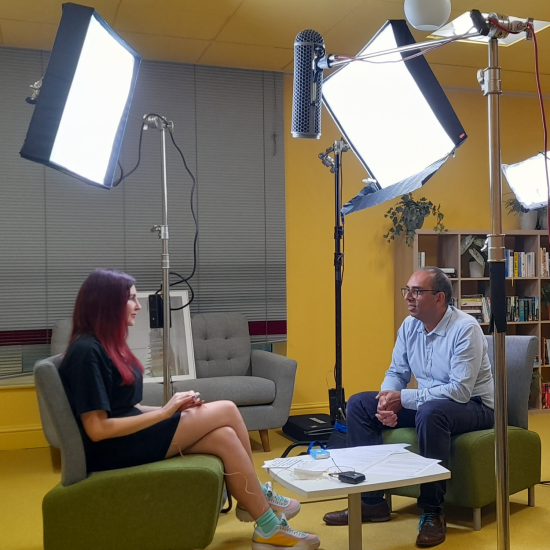Video: What is investing?
Our customers often ask us about investing and what happens to the money they pay into their OneFamily product.
So we thought it would be useful for you to hear from the experts. State Street Global Advisors (SSGA) is an investment management company headquartered in Boston, US. The team at SSGA manages the funds that our products invest in.
Customer Experience and Quality Assurance Manager, Helen Kimber, put your questions to Altaf Kassam, an Investment Strategist at SSGA.
Altaf joined us at the OneFamily office in Brighton to explain to our customers what happens to the money they pay into their OneFamily investment accounts.
He spoke to Helen about how the value of funds change over time and answered her questions about the impact global events can have on our customers' investments.
With many people weighing up whether to invest or to put their money into an account that grows with interest, Helen asked Altaf how the two options differ and was surprised to learn that interest-only accounts also carry a degree of risk.
Please note, the value of your investments can go down as well as up, so there is a chance that you could get back less than you've paid in. Neither OneFamily nor State Street Global Advisors is able to tell you what you should do with your money, if you're not sure please speak to someone who can advise you.
Let's talk about investing
Anything you weren't clear on?
Inflation
Inflation is the increase in price of the things we buy and use. This causes the value of money to go down over time, meaning that you can't buy as much with £1 as you used to be able to.
10 years ago, a single 330ml can of coke would have cost you around 75p. Today, you're unlikely to find one for less than £1. That's because £1 can now buy you roughly what 75p could have bought you in 2013.
In the future, the things you'll want to buy are likely to cost more than they do now. This is why Altaf says that ideally you want your savings or investments to grow at least as much as inflation. If that doesn't happen, you won't be able to buy as much with your savings as you could today.
Investment return
Your "investment return" or "return on investment" is money you make when investing. So if you invest £100 and the value of that investment increases to £150, then your investment return is £50.
Altaf also mentions "returns on savings", he's referring here to interest that your money makes when in a savings account.
Long-term investing
When Altaf talks about "investing over the long term", he means five years or more.
Risk
When we talk about "risk" in investing, we mean the risk of your investment going down in value or not growing by as much as inflation.
It doesn't mean that you could end up owing money, but there is always a risk with investing that you could get back less than you've paid in.
Spending power
This simply means how much your money can buy. You could think of it as your money's 'power' when it comes to spending.
How much spending power your money has again comes down to inflation. £1 is worth less today than it was 10 years ago so it can't buy as much as it used to - its spending power has dropped.
Upside potential
When Altaf tells Helen that shares have more "upside potential" than bonds, he is saying that more money can be made with this type of investing. Although, of course, this isn't guaranteed.
As Altaf goes on to explain, there's also more risk of losing money when you invest in shares than there is with bonds.

Hear more from Helen and Altaf
You may also be interested in:
How does the annual ISA allowance work?
Individual savings accounts (ISAs) allow UK residents to invest or save their money without paying tax on any money they make.
Is it better to save or invest your money?
Investing is generally riskier than putting your money in a savings account, but it also means there's potential for your money to grow more.
What to do if your stocks and shares ISA is losing value
Turbulent markets can affect the value of your stocks and shares investment, but the worst thing you can do is panic.
Investing for beginners
At OneFamily, we believe everyone should have the same access to different ways to grow their money as everyone else.
